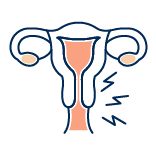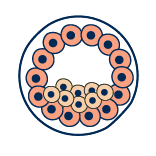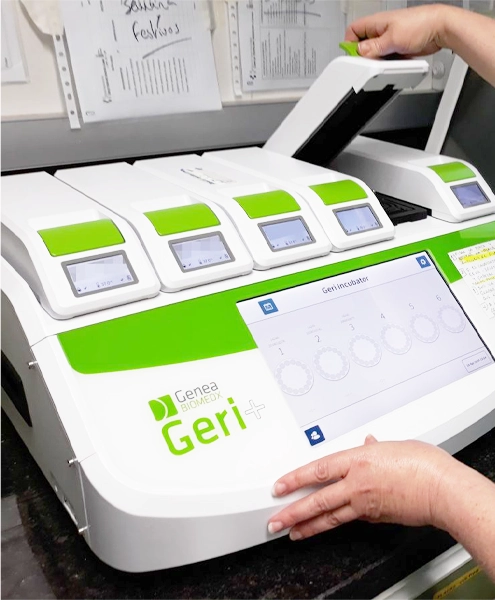Implantation failure and recurrent miscarriage
After several in vitro fertilisation (IVF) treatments, has it been impossible to achieve a viable pregnancy? At Tambre we carry out a complex, multidisciplinary study to find out the reasons behind implantation failure or repeated miscarriages.
Knowing the causes of previous IVF failures allows us to adapt and personalise treatments to increase the chances of successful implantation.
Would you like us to study your case?
What is implantation failure and repeat miscarriage?
Implantation failure occurs when a pregnancy is not achieved after 3 good quality embryo transfers through IVF.
In the case of repeated miscarriages, they are considered as such when the embryo manages to implant and give rise to pregnancy, but the woman suffers a spontaneous loss before the 20th week of gestation. When this situation occurs in two or more pregnancies, they are considered to be recurrent miscarriages.
In both situations, and given the frustration involved, it is normal to wonder why the pregnancy has not been possible, what has gone wrong, or even whether it is worth continuing with the treatments.


To find out the causes of implantation failures and repeated miscarriages, at Tambre we analyse previous IVF treatment failures with a very detailed, multidisciplinary study involving our team of fertility doctors, embryologists, geneticists and immunologists.
Once we know why previous IVF treatments have failed, we can prescribe a new personalised treatment to increase the chances of pregnancy.
Multidisciplinary care for implantation failure
Failure of the embryo to implant in the mother’s womb or loss of the embryo in the first weeks of gestation may be due to a variety of factors involving the woman, the male and the embryo itself.
Failure of the embryo to implant in the mother’s uterus or miscarriage in the first weeks of gestation may be due to a variety of factors involving the woman, the man or the embryo itself. To study these factors and find the cause or causes of implantation failure, Tambre has an Implantation Failure Unit made up of specialists from different disciplines who carry out specific tests to complete the diagnosis:

Female factors
To check whether the endometrium is in an optimal state for transfer, Tambre offers endometrial receptivity tests which provide valuable information to organise the transfer in a personalised way:
-ES-TIME test: this allows us to know if the implantation window, the key moment to achieve nidation, was displaced, something that happens in around 30% of patients.
-ES-META test:this allows us to discover whether pathogenic agents are behind the implantation failures that are causing the embryo not to implant. This is the case with microorganisms that cause endometritis or the endometrial microbiome.
The presence of polyps or myomas or adenomyosis (endometrial tissue that develops in the muscular wall of the uterus), as well as alterations in the morphology of the uterus (unicornuate uterus, T-shaped uterus etc.), can hinder the implantation of the embryo.
The presence in maternal blood of antibodies called antiphospholipids causes thrombi at the placental level that lead to pregnancy loss. Fortunately, this is a cause of repeat miscarriage that can be treated with aspirin and heparin. Tambre has a pioneering Reproductive Immunology Unit in Spain that helps us to investigate immunological factors.
Hormonal fluctuations can affect the endometrium and hinder implantation.
Uterine infections or inflammation, such as endometritis, can cause reproductive complications.



Male factors
At Tambre we have our own andrology laboratory where we study possible male factors that may cause repeated miscarriages or implantation failure:
At Tambre, as well as carrying out a semen analysis, we also assess sperm fragmentation (CometFertitity) to check the DNA chain and decide whether it is necessary to improve semen quality. We can also use, if necessary, specific sperm selection techniques such as ZyMot-ICSI (Chip Fertile) which allows us to exclude fragmented spermatozoa to improve fertilisation and subsequent embryo development.
We can carry out a compatibility study between the uterine KIR (killer immunoglobulin-like receptors) and the HLA-C molecules that the embryo will present. With a simple blood test of the mother-to-be and the male, we can find out if there is an immunological incompatibility that could cause the mother’s body to reject the embryo.

Embryological factors
Most cases of embryo implantation failure and repeated miscarriage are due to problems with the embryo. After all, the embryo comes from the combination of two reproductive cells, the sperm and the oocyte, and it is possible for alterations to occur at the time of embryo formation. Specifically, the most frequent cause is an abnormality in the number and arrangement of the embryonic chromosomes.
To check and select embryos free of chromosomal and/or genetic alterations before transfer, we can carry out Preimplantation Genetic Diagnosis (PGD). The ideal here is to transfer embryos free of chromosomal alterations, as this drastically reduces the risk of miscarriage, even in older patients.

Implantation failures have at least one cause.
Now is the time to discover it
Customised solutions to reduce implantation failure
At Tambre we provide customised solutions that allow us to improve the chances of embryo implantation and subsequent pregnancy development:

Embryo biopsy
Preimplantation Genetic Diagnosis (PGD) allows us to select embryos free of chromosomal and/or genetic alterations before transfer to the mother’s uterus, thus increasing the chances of successful implantation.

Improved culture conditions
We have a time-lapse embryo incubator that allows us to check the correct evolution of the embryos and to provide conditions that are as close as possible to the uterus to allow the correct development of the embryos.

Assisted hatching
In order to facilitate the implantation of the embryo, we can open the outer layer of the embryo, just before the transfer, to make it easier for the embryo to come out and adhere to the endometrium more easily.

Endometrial preparation
By using endometrial biopsy we can locate a personalised “window of implantation” and know the exact number of hours of progesterone required by the patient between the moment of initiation and the moment of embryo transfer.

Endometrial PRP
If the patient does not respond well to the endometrial preparation, we can inoculate the patient’s own platelet-rich plasma (PRP) into the endometrium in order to achieve cell proliferation of the endometrial tissue that makes implantation possible.

Blastocyst transfer
In order to select the best embryos with the best implantation capacity, we can carry out the transfer when they have reached the blastocyst stage, i.e. around 5/6 days of development after fertilisation.

Delayed transfer
Instead of transferring the embryos fresh, we freeze them for another cycle. In this way, we can carry out an endometrial preparation so that the endometrium is in optimal condition and is more receptive.

Drugs
We have different drugs that help us to avoid implantation failures caused by cholesterol problems, diabetes, thyroid, as well as coagulation or immune rejection.

Surgery
In the event of certain problems, such as polyps or fibroids, we can perform a hysteroscopy to correct them. Similarly, if uterine abnormalities are identified, surgery may correct them.
45 years of medical excellence
We are pioneers in assisted reproduction in Spain and Europe.
We design tailor-made treatments.
- State-of-the-art assisted reproduction laboratory.
- Our own andrology laboratory.
- RI Witness™ para la seguridad y trazabilidad de los gametos.
- GERI®: Incubador de embriones®.
- Fenomatch, encontramos a la donante de óvulos y/o el donante de esperma adecuado y compatible contigo.
- Chip Fertile, selección de los mejores espermatozoides antes de un ICSI.
- You will have your own gynaecologist and nurse, except for emergencies, and the same medical team will follow your case in depth and attend you from the beginning to the end of the treatment.
- You will have a consultant from our Specialised Tambre Care team who will support you and answer any question you may have throughout the whole process.

Te enviamos a tu mail toda esta información en PDF
¿Te gustaría tener acceso a toda esta información sobre fallo de implantación y aborto de repetición en cualquier momento?
Te lo enviamos en formato pdf a tu email, así podrás revisarlo tranquilamente cuando lo desees.
Dreams come true
Real stories like yours
We stay with you
Our support team is always at your side for whatever you need
Shall we call you?
Our support team is always at your side for whatever you need
Or send us an email to atpaciente@clinicatambre.com











